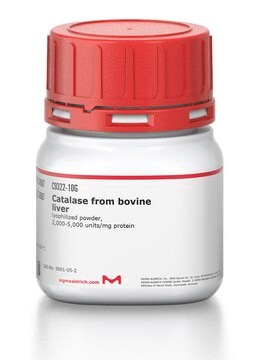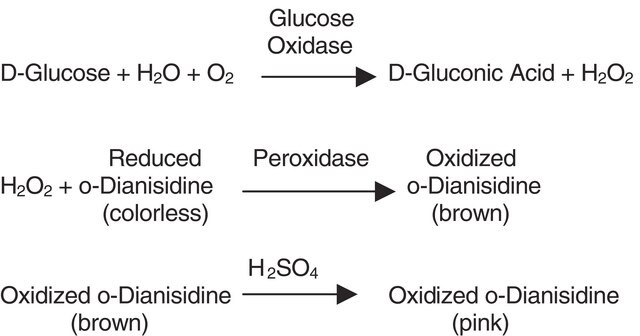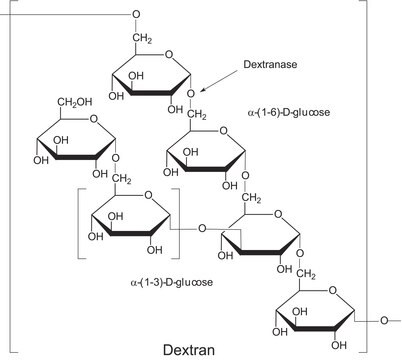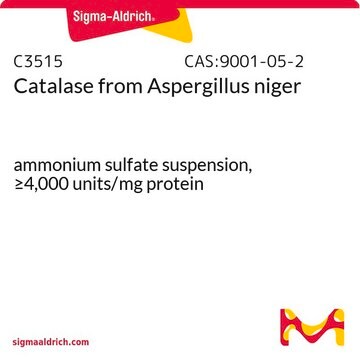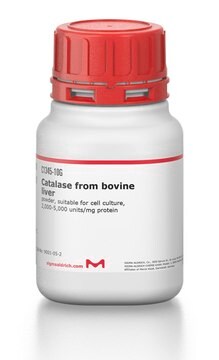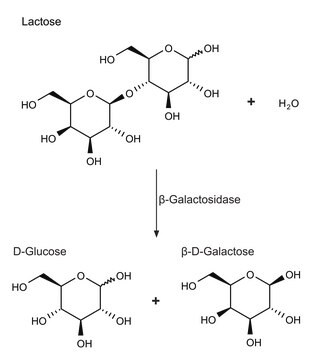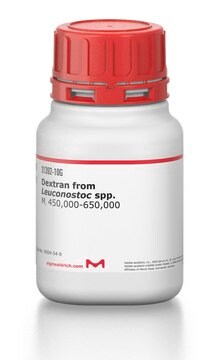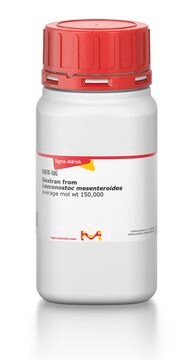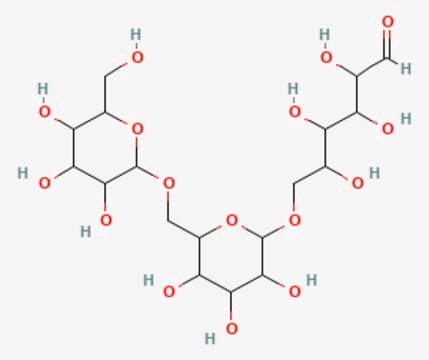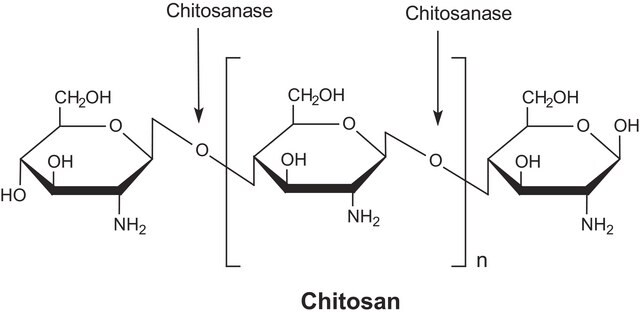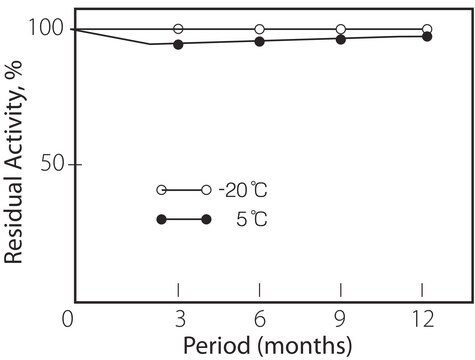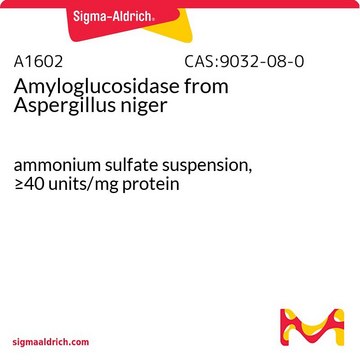D0443
Dextranase from Chaetomium erraticum
Synonyme(s) :
Dextranase Plus L, 1,6-α-D-Glucan 6-glucanohydrolase
Se connecterpour consulter vos tarifs contractuels et ceux de votre entreprise/organisme
About This Item
Produits recommandés
Catégories apparentées
Description générale
A product of Novozymes Corp.
Dextranase is generated by many microorganisms, including bacteria, filamentous fungi, and yeast.
Application
Dextranase from Chaetomium erraticum has been used:
- in microcarrier dissolution to produce multicellular 3D spheroids for drug discovery
- in in vitro digestion of extracellular polysaccharide (EPS) from the bacterial isolates
- in a study to investigate the immobilization of dextranase
- to investigate the optimization of process conditions for enzymatic modification of alternan
Actions biochimiques/physiologiques
Dextranase is an endodextranase that hydrolyzes α-(1,6)-glycosidic linkages in dextran. It has many industrial and clinical applications such as food processing, sugar modification, and medicine preparation. Dextranase is widely used to produce alternated sugar beet and isomaltooligosaccharides (IMOs), a prebiotic functional food. The low molecular weight dextran obtained from dextranase serves as a synthetic blood volume expander. Dextranase can be coupled to antibodies for the detection of tumor cells. It prevents the occurrence of dental plaques by depolymerizing microbial dextran deposits in teeth. Hence, it is used in dental care products.
Notes préparatoires
A fungal dextranase produced by submerged fermentation of Chaetomium erraticum.
Remarque sur l'analyse
Stable in the pH range of 3-7 and at temperatures up to approx. 70 °C. For most applications, the preferred conditions are pH 5-6 and a temperature of 50-60 °C.
Autres remarques
View more information on enzymes for complex carbohydrate analysis at www.sigma-aldrich.com/enzymeexplorer
Mention d'avertissement
Danger
Mentions de danger
Conseils de prudence
Classification des risques
Resp. Sens. 1
Code de la classe de stockage
11 - Combustible Solids
Classe de danger pour l'eau (WGK)
WGK 1
Point d'éclair (°F)
Not applicable
Point d'éclair (°C)
Not applicable
Équipement de protection individuelle
Eyeshields, Gloves, type N95 (US)
Faites votre choix parmi les versions les plus récentes :
Déjà en possession de ce produit ?
Retrouvez la documentation relative aux produits que vous avez récemment achetés dans la Bibliothèque de documents.
Les clients ont également consulté
Frank Alwin Erhardt et al.
Journal of biotechnology, 131(4), 440-447 (2007-09-19)
In order to facilitate the Co-Immobilization of dextransucrase and dextranase, various techniques for the immobilization of industrial endo-dextranase from Chaetomium erraticum (Novozymes A/S) were researched. Adsorption isotherms at various pH-values have been determined for bentonite (Montmorillonite), hydroxyapatite and Streamline DEAE.
F Abeille et al.
Lab on a chip, 14(18), 3510-3518 (2014-07-12)
Microfluidic bioreactors are expected to impact cell therapy and biopharmaceutical production due to their ability to control cellular microenvironments. This work presents a novel approach for continuous cell culture in a microfluidic system. Microcarriers (i.e., microbeads) are used as growth
Co-immobilization of dextransucrase and dextranase in epoxy-agarose-tailoring oligosaccharides synthesis
da Silva R, et al.
Process Biochemistry (Oxford, United Kingdom), 78, 71-81 (2019)
Young-Min Kim et al.
Applied microbiology and biotechnology, 91(2), 329-339 (2011-04-12)
Multiple forms of native and recombinant endo-dextranases (Dexs) of the glycoside hydrolase family (GH) 66 exist. The GH 66 Dex gene from Streptococcus mutans ATCC 25175 (SmDex) was expressed in Escherichia coli. The recombinant full-size (95.4 kDa) SmDex protein was digested
Mohanad Bashari et al.
Ultrasonics sonochemistry, 20(1), 155-161 (2012-07-24)
In our current research work, the effect of ultrasound irradiation on the enzymatic activity and enzymatic hydrolysis kinetic parameters of dextran catalysis by dextranase were investigated. Furthermore, the effects of ultrasound irradiation on the structure of dextranase were investigated with
Notre équipe de scientifiques dispose d'une expérience dans tous les secteurs de la recherche, notamment en sciences de la vie, science des matériaux, synthèse chimique, chromatographie, analyse et dans de nombreux autres domaines..
Contacter notre Service technique